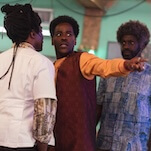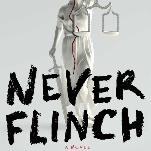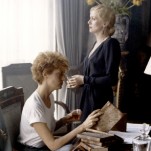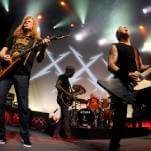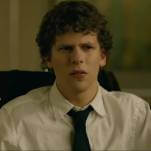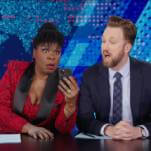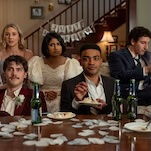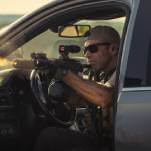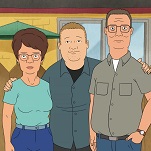AVC: Is that a symptom of a larger problem in movies and TV?
LB: I feel lucky that it is not like that now, but obviously it still exists. The convention of all these television shows is that they’re attracting a certain demographic. Whether it’s young girls, where TV shows have glamorous “it girls” that are not being funny but being cute, sexy, or whatever that is. Now there is a girthier opportunity for women to find funnier, more complex roles. A lot of work is being generated by woman now. If you look at the writers, it’s not a boys’ club. There is a surge of female writing talent. It’s not a statement of [in whiney voice], “Woman can be funny to!” There are a lot of funny people and a lot of unfunny people. Some of them are women and some of them are dudes. It’s a little more nonchalant versus making a statement, which I like.
AVC: What was the appeal of comedy for you?
LB: I had always done comedy when I was younger, coming up through school. Since the age of 2, I liked the idea of performing. I was precocious like that. I always tried to make people laugh. I attribute that to—I come from a family of divorce. It was a way to distract myself from stuff. I always thought it was interesting that my brother and I existed in this really tight bond, and we would just take the piss out of pretty much everything. It started as making my brother laugh, basically. I knew I wanted to be an actor so it would be great if I could make people laugh while I was doing this, because I could be other characters and other people, and I could hide behind things. It was a great out for me, and a mode of expression. The plays I did in college were always a mixture. I went to drama school and we did not do exclusively comedy. I studied in England, mostly classics: from Chekov to John Ford to Elizabethan to Shakespeare.
AVC: After studying so much stage acting then moving to L.A. and being exposed to the industry, what was your experience in the discrepancy between the two? It seems like stage people and film and TV people are flexing very different muscles.
LB: They’re different muscles, but acting is acting. In theater, finding truth and searching the human condition—that’s the same muscle, you’re just flexing it differently. When I first got here I was too big. Now I have to exercise restraint. In any comedy piece I’m doing or anything, I will air on the side of large. Even in Childrens Hospital I exercise restraint.
AVC: That show can be really large, but there isn’t an individual performance that reads as large.
LB: Right, sometimes Childrens Hospital is comedy camp, and you get all excited and want to do ridiculous things. Even today, that is what I’ve been working with. I remember when I first got out here I went to audition to play a guest star on Two And A Half Men or something like that to play the “hot girl” that comes in and says something funny. I remember I came in, it was Allison Jones who was casting director. This was the first time I said to myself, “I am not going to do anything. I am going to know my lines, but I am not going to do anything.” As an experiment. I went in and sat on my hands, because I tend to gesticulate a lot, and I sat there and just did my lines straight. And she said, “Who are you?” By the way, I did not get the part, but I got the greatest feedback I had ever gotten by not doing anything. If I don’t do anything, then I’m still going to be me. It’s a good place to fuckin’ start, I’ll tell you that.
AVC: You mentioned that you went out for the “hot girl” or “the girl” in stuff—and usually “the girl” is a hot girl, at least in 90 percent of movies and TV. Do you feel your looks have opened doors that normally wouldn’t be open?
LB: Fuck yeah they do. Looks are 70 percent of how you get into a door. There is this amalgamation of so many different tangents, which are looks, chops, luck, and wearing the right outfit. It’s stupid shit. Sometimes you remind them of a cousin they hate, and there’s nothing you can do about that. I’m not even saying good looks, just “the look,” whatever it is. “I want a brunette with green eyes who is tall.” I can go in there and they’re like, “Great, that’s exactly what I was looking for,” and then somebody else can go in and they can be a short redhead with cool freckles and they can be like, “I don’t know, that kind of reminds me of the girl who I first fell in love with.” The point is, I got in the room because of the description.
AVC: Part of the appeal of Orgy is that it’s all beautiful people, though. Could that film have existed if you swapped out a character for someone less attractive?
LB: When I talk to my friends who are “attractive girls in comedy” the majority of them—and I feel I’m in this category, I can look “hot girl” if you want me to, but shit can get ugly at the right angle and the wrong makeup. What is nice about most of my lady comrades in the comedy world is that these are girls that if you want to musk them up… and I’m included. There are moments where I feel like one of the great-looking people, and then there are other moments where I feel like, “This is an atrocity.” My whole family’s like that, actually. You can look at photos where we look, like, battered. I feel that’s a huge asset for me.
AVC: Childrens Hospital feels like a tiny comedy community, given all the guest stars who swing by and all the comedy groups represented on it. How much do you feel a part of that larger comedy community?
LB: It’s a family. There are comedy cliques, but let’s be nicer about it and call it different families. Most of the time they overlap a little bit, which makes them cordial. There is the Judd Apatow family, Childrens Hospital, there’s The State and Human Giant families, the SNL family, and the more commercial comedy with the Ashtons and Heigls. They all define themselves and are not good or bad, it’s just a different playground. Then there is the more absurdist comedians like Tim and Eric and Brett Gelman, the alt-comedy scene, and then there is the stand-up scene, which is a whole different family, but they all talk to each other. It’s great to be a part of that community.
AVC: What do you think is the impetus behind forming these cliques? It seems like a residual effect from the fact that more comics are creating content for themselves and their friends nowadays.
LB: There is a surge of content, so there is a broader scope. Whether you have followers on Twitter or you’re making shit on Funny Or Die, there is a presence. People are overlapping into other cliques. I want to go on record saying that clique is a negative, corrosive-sounding word. That said, we can think of it as more like a family, because cliques don’t allow people in. The real term is troupes. It supports the theory that there is not a girls’ club or a boys’ club. All of the different families have ladies and boys in them.
AVC: It seems like recently you’ve been all over films and TV. What has that saturation has afforded you, and where you think it came from?
LB: You really think I’m saturated? I get on the subway and people say, “Can you move the fuck out of my way.” People have no idea who I am.
AVC: Well, the season finale of Childrens Hospital is one day before your film opens, and you’ve done so many films and shows this year already. It just feels like you’re very much on the radar now, similar to how, say, this is Jason Sudeikis’ year.
LB: It’s wildly different for those guys. For me it is, “There’s that girl, she keeps popping up in stuff.” But there are some people who say, “I like Lake Bell. I know who that person is.” And other people who say, “Oh, that girl. She is funny.” Or, “I hate her, she looks like Gonzo.” Take Jason Bateman for instance. What happens is, you shoot movies at different times in different years—and this happened with Jude Law. Literally five movies came out in one year. It was ridiculous. You can shoot movies three years ago, four years ago, one year ago, and two years ago, and then all of a sudden they all come out in the same year and there is nothing you can do about it. For Bateman I think that happened, and for Sudeikis I think it’s quite good because he is relatively new, and Bateman has been churning out movies for a few years.
AVC: Do you think comedians themselves are aware of the fact that all of these movies now seem to have very large ensembles, which means more opportunities for people to be out there, which also means that they are going to be everywhere?
LB: So you mean that the same people are in everything?
AVC: Right. There’s a sense of community, but a lot of repetition. You seem to be in a lot of ensemble comedies, but you also go off and have your own projects, so I was wondering what your perspective was.
LB: The community aspect of it is a positive thing. All of your studio movies are usually helmed by names who you know. There is usually someone at the crux like, [In annoying, official-sounding voice]“Bradley Cooper” or “Ashton Kutcher” or Bateman or fuckin’ Cameron Diaz or Jennifer Aniston. You got your temple humans who sit there. Then you have if you sprinkle in this alt-interesting community. I think it’s a great template. It gives opportunities, and it’s such a large community that I don’t feel like we are overlapping too much. For instance, with the Judd Apatow movies, he has his family traditionally in those movies over and over again, and I think it works. They are funny. They get his sensibility. Occasionally he throws a bone to somebody outside of his family, and I have got to commend him—the template works. If it’s not broke, you know?
AVC: What drove you to want to write and direct your own short film, Worst Enemy, which was at Sundance last year?
LB: The impetus there was I wrote a script that I wanted to direct and star in, and there was no way in hell I was going to embark on that endeavor without [first] making a short film. It was a test to myself, and worked as a calling card for me as a filmmaker. It was truly one of the greatest experiences I’ve ever had, and it going to Sundance was one of the bonuses I never could have anticipated nor asked for. I’m in pre-production for the film I had written and wanted to make, so I successfully delivered what in my wildest dreams I could have hoped for, and the film that I’m making now is called In A World. It’s about a female voiceover artist who sets out to conquer the male dominated world of voiceover.
AVC: What prompted the decision to not appear in your short film?
LB: I wanted to be all ears on that. Michaela Watkins stars in that. She is also in my other movie where she plays my older sister. I had an amazing cast, my cast is remarkable.
AVC: When did you first decide to create your own stuff?
LB: I had always been just doing it anyway, and I didn’t know you’re not supposed to do that. I had already been writing since I was a little girl. My mom would go to Kinko’s and make it look like it was a real book; she was always very supportive in that. We used to have this whole bond over letter-writing. We would write all of these elaborate letters, and if I ever had to write an official letter to someone, we would get really into that and study the art of letter-writing. It was always part of my childhood, and I started writing dialogue-based things when I first moved out. I did it privately. I didn’t tell anyone about it because I didn’t wanted to be dubbed a weak multi-hyphenate with nothing to show for it. Then I did the short film when I was ready. It was my agent who said, “Why don’t you fuckin’ make a short film and direct this movie?”
AVC: Do you find that it’s tough for people to see actors as writers?
LB: I don’t think it’s a problem anymore. It’s not a given that it’s going to be good. You could say you’re a writer, but that does not mean you are going to be fucking good at it. I think people are used to the multi-hyphenate. It doesn’t really matter if they’re not. Initially, part of me did not want to put my name on it, but that’s bullshit. Fight or flight. So with the short film I was like, “I want to make this the way I goddamn want to make it. I see it so clearly. I am going to assemble a dorky team that is going to do the homework with me. We are going to attack this like a little nugget of fun.” And that is exactly how we did it. Filmmaking is a huge privilege; it’s not brain surgery. It’s art, and art is supposed to be an enjoyable process, and it is an enjoyable experience for me. Eighty percent is the making of it, the inception of it. It’s a long fucking haul, and then there is the product, which is great.
AVC: It’s easy to be cynical about the state of films nowadays, but you’re very positive about the artfulness of the medium.
LB: But I see great ones. You don’t have to go see the poop ones. You could see Win Win—there’s an actor-writer-director [Thomas McCarthy]. In another fucking realm you could see Children Of Men, but more currently you could see movies that are out there that are great and inspiring, that make you go, “That was really fun, I loved that.” That’s all you want. We work so hard for that one reaction, which is people coming out of a movie going, “That was fun, that was really great. Where do you want to get dinner?” Maybe they talk about it at dinner, they see you and they say, “That was a really great film, thank you. That was awesome.”
AVC: Yeah, but what about, “Holy fucking shit, I need to go sit in a room alone and process what it is I just saw”?
LB: Yes there’s that too. That’s fucking cool. That’s not the business that I’m in. In the same way I’m not a sketch writer. I know what I am: I have a sensitive comedic sensibility. What turns me on is subtle neurosis. That’s my game. I’m not an action writer or a thriller writer and I’m not a sketch writer. I don’t pretend to be those things. Then it would not be fun. Then you are in a space where this is painful.























